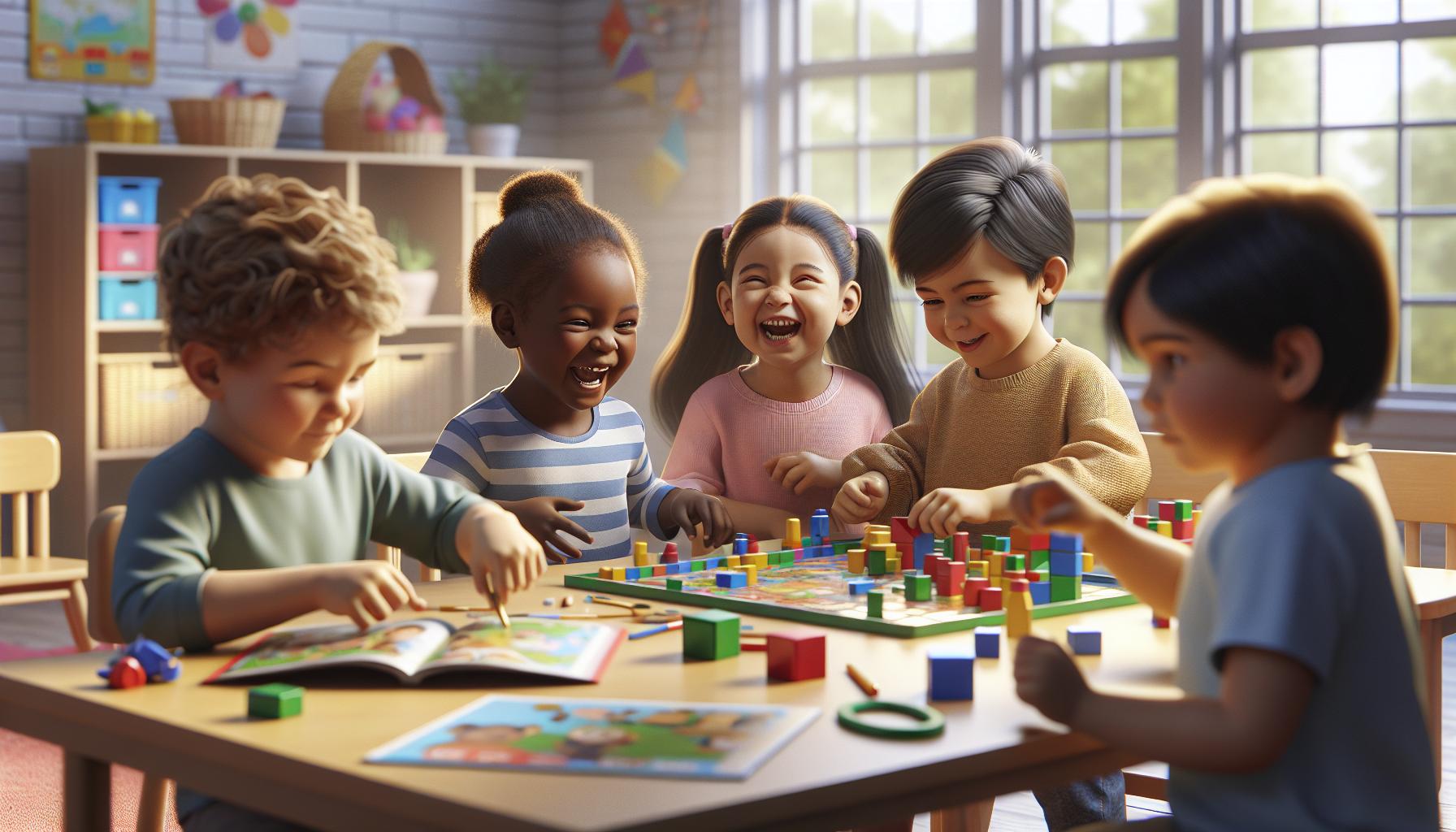Key Takeaways
- Daycare’s Role in Development: Daycare significantly influences a child’s emotional, social, and cognitive growth, making it crucial for parents to understand its impact.
- Quality Matters: The quality of daycare, including staff training and stimulating environments, directly affects developmental outcomes, with high-quality settings fostering better skills.
- Social Skills Benefits: Regular interactions in daycare promote essential social skills, such as sharing and cooperation, which are vital for future relationships.
- Parental Involvement is Key: Active communication and involvement from parents with daycare providers enhance a child’s developmental journey and ensure consistency.
- Balance is Essential: The duration of daycare attendance should be balanced with family time to mitigate potential issues like attachment concerns and behavioral problems.
- Individual Differences: Every child responds differently to daycare based on their temperament, highlighting the need for a personalized approach to early childhood care decisions.
In today’s fast-paced world, many parents rely on daycare as a vital resource for their children. Understanding the effects of daycare on child development psychology is crucial for making informed decisions about early childhood care. Research shows that daycare can play a significant role in shaping a child’s emotional, social, and cognitive growth.
Children exposed to quality daycare environments often develop essential skills that influence their future interactions and learning experiences. However, the impact of daycare varies based on factors like the quality of care, duration of attendance, and individual child temperament. As parents navigate this important choice, exploring the nuances of daycare’s effects can provide valuable insights into fostering optimal development for their little ones.
Effects of Daycare on Child Development Psychology
Daycare plays a significant role in child development by providing structured environments for learning and socialization. Various types of daycare, including home-based and center-based settings, cater to different needs and parental preferences.
Types of Daycare
- Home-based Daycare: Often run by individuals in their residences, this option typically features smaller groups and a family-like atmosphere.
- Center-based Daycare: These institutions, operated by organizations, often have larger enrollments and structured curricula that focus on various developmental domains.
Impact on Developmental Outcomes
Daycare influences emotional, social, and cognitive development in distinct ways. Children exposed to quality daycare exhibit the following benefits:
- Social Skills Development: Regular interactions with peers cultivate sharing and cooperation, essential for future relationships.
- Emotional Regulation: Engaging with caregivers and other children helps children learn to navigate their feelings and develop coping strategies.
- Cognitive Growth: Learning activities in daycare, such as storytelling and group play, enhance language skills and problem-solving abilities.
Factors Influencing Daycare Effects
The impact of daycare varies based on several factors:
- Quality of Care: High-quality daycare settings prioritize staff training, safety, and stimulating environments.
- Duration of Attendance: Longer hours in daycare may correlate with increased social skills but could also lead to attachment issues if not balanced with family time.
- Child Temperament: Individual differences in temperament influence how a child adapts to daycare environments; some children thrive, while others may struggle.
Parental Involvement
Parental engagement remains crucial. Active communication between parents and daycare providers fosters consistency and supports the child’s development. Involvement can range from attending events to regular discussions about the child’s progress.
Understanding the dynamics of daycare and its multifaceted impact on child development equips parents to make informed choices regarding early childhood care. Quality daycare, combined with supportive home environments, enhances children’s growth across multiple domains.
Positive Effects of Daycare

Daycare offers several advantages that support various aspects of child development. Quality daycare programs play a significant role in enhancing cognitive abilities and social skills.
Cognitive Development
Daycare contributes positively to cognitive development through structured activities, educational programs, and age-appropriate learning environments. Children in daycare experience exposure to diverse learning experiences, which can stimulate critical thinking and problem-solving skills. Research indicates that children who attend high-quality daycare exhibit improved language proficiency and math skills compared to those who remain at home. Engaging with trained caregivers and peers also fosters curiosity, encouraging children to explore and learn actively.
Social Skills Enhancement
Daycare provides a platform for children to develop essential social skills through regular interactions with peers and adults. Children learn sharing, cooperation, and conflict resolution in a group setting. Exposure to diverse social scenarios helps them navigate friendships and form relationships effectively. Studies highlight that children in daycare tend to display enhanced emotional regulation and empathy, skills vital for future interpersonal relationships. Consistent interaction promotes the development of a strong sense of community, as children learn to understand and accept different perspectives.
Negative Effects of Daycare

Daycare can pose challenges for child development, impacting behavior and emotional attachments. Various concerns require attention when assessing the effects of daycare on children.
Behavioral Issues
Behavioral issues may arise in children attending daycare, especially in environments with inadequate supervision. Children often display increased aggression or disruptive behavior, potentially due to overstimulation or lack of individualized attention. Studies indicate that high-crowd settings and frequent transitions between caregivers can lead to confusion and insecurity, exacerbating behavioral problems. Regular exposure to peer conflict in daycare may hinder the development of essential self-regulation skills, as modeled behavior may not align with family norms.
Attachment Concerns
Attachment concerns can also develop, particularly when children spend extended hours in daycare. Inconsistent caregiver relationships may disrupt secure attachment formation. Research demonstrates that children who experience frequent changes in caregivers struggle with trust and emotional connections. Some children exhibit anxiety when separated from primary caregivers, affecting both daily functioning and long-term relationship building. Minimizing separation anxiety and ensuring stable, nurturing environments are crucial for fostering healthy emotional attachments in early childhood.
Factors Influencing Daycare Impact

Several factors influence how daycare affects child development, primarily focusing on the quality of care and the duration of stay.
Quality of Care
Quality of care plays a crucial role in child development outcomes. High-quality daycare settings feature well-trained staff, low child-to-caregiver ratios, and engaging environments that stimulate learning. Research indicates that children in such environments show advanced language skills, better emotional regulation, and enhanced cognitive abilities. Effective caregiver interactions facilitate secure attachments, vital for emotional security and social development. Structured curricula and planned activities further impact learning by promoting critical thinking and problem-solving skills. Conversely, low-quality daycare can lead to negative behaviors, including increased aggression and anxiety, as well as a lack of emotional support.
Duration of Stay
Duration of stay significantly affects developmental outcomes in daycare. Longer exposure to quality daycare tends to correlate with better social and cognitive skills, as children benefit from sustained interactions and experiences. Studies show that children attending daycare for more than 20 hours per week often display improved language and math skills compared to those in less structured environments. However, extended hours in low-quality settings can foster behavioral issues and attachment insecurities. Balancing the amount of time spent in daycare with parental interaction ensures optimal development, promoting a supportive home environment alongside daycare experiences.
The Effects of Daycare on Child Development Psychology
The effects of daycare on child development psychology are multifaceted and depend on various factors. Quality daycare can significantly enhance a child’s emotional, social, and cognitive skills. However it’s crucial for parents to consider the quality of care and the environment their child is in. A supportive and nurturing daycare setting can foster positive growth while inadequate care can lead to challenges.
Balancing daycare experiences with parental involvement is essential for optimal development. By understanding the dynamics at play parents can make informed decisions that align with their child’s needs. Ultimately the right daycare choice can provide a solid foundation for a child’s future interactions and learning experiences.